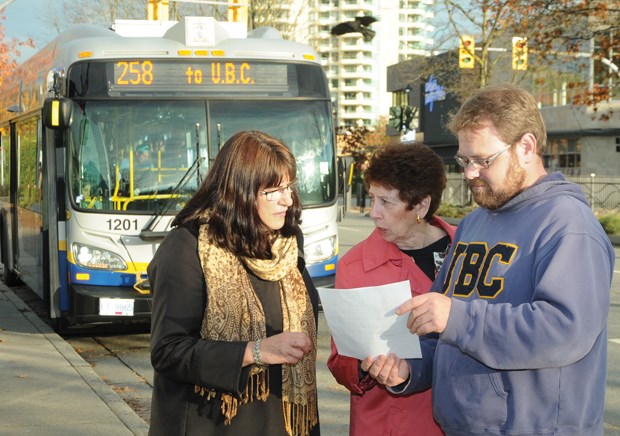The idea of TransLink eliminating an express bus from Dundarave to UBC is “totally unacceptable,” says West Vancouver Mayor Michael Smith.
Smith was reacting to TransLink’s proposal to cut service for the financially “less successful” 258 bus, which directly connects West Vancouver students and UBC faculty members to the Point Grey campus in about 40 minutes.
The mayor also said the municipality, which operates the West Vancouver Blue Bus system under the TransLink umbrella, was not consulted on proposed changes to the 258 ahead of time. “And this service for our students to UBC is one that needs to continue,” said Smith.
Earlier this month TransLink announced it was seeking public feedback on potential changes to a handful of North Shore bus routes, including the 258.
As it looks to optimize bus service for the region, TransLink said it has identified the 258 as a high-cost passenger route that ranks 200th out of 212 routes for performance. Contributing to that poor grade is the fact the 258 makes four morning runs from Dundarave to UBC, but comes back empty on the return trip.
“So, it’s a long route that serves a specialized market,” said TransLink spokesperson Chris Bryan.
When it comes to crunching numbers for the 258, which runs from September to April, Smith said TransLink and Blue Bus are not on the same page.
Looking at September’s passenger counts, Blue Bus is reporting double the amount of riders for the 258 than TransLink’s stats for that same time period.
TransLink said peak level use for the 258 is 30 passengers on average for a 55-seat bus, or approximately 200 passengers per day going to and from UBC.
Blue Bus, meanwhile, puts the daily passenger count at 434, while noting that the buses often experience overloads between 8 a.m. and 9 a.m.
“The salient fact is the route is at or near capacity. It’s one that our residents need, particularly the students,” said Smith, adding that the 44 bus is not an acceptable alternative.
If the 258 service is scrapped, passengers bound for UBC would take the 250 or 257 Vancouver buses and transfer at Burrard and Georgia to the 44 UBC bus.
The alternative is not sitting well with some West Vancouver students and UBC faculty members who have taken the 258 for decades and are protesting the proposed schedule change.
“For me, this change means 140 hours more per year spent on a bus,” said West Vancouver resident Stephen Price, a mature student in UBC’s education program.
Price took the proposed alternative route one morning last week and experienced a significantly longer commute. “The scheduled 44 (bus) didn’t show up, so the commute from Park Royal to UBC was one hour and 40 minutes instead of 40 minutes,” said Price.
West Vancouver resident Lucille Hoover, a UBC research technician, has faithfully taken the 258 to and from the university every day for over 30 years. Figuring she is one of the original riders of the route, which she says started in 1983, Hoover has joined a chorus of regular 258 commuters decrying the proposed shakeup to their routine.
Hoover said she sometimes takes the 44 but often the bus is “standing-room only and you squeeze on.”
Once the 44 rolls up to Georgia and Burrard, explains Hoover, it’s the third stop on the route and the bus has already picked up heavy loads of passengers from Waterfront Station. Hoover’s concern is that she will be left waiting at the curb.
TransLink said it anticipates, under the proposed changes, the travel time will be roughly the same even with the transfer factored in.
“We believe once the adjustments are made it will actually improve the speed for the majority of customers travelling to UBC from North Shore and downtown Vancouver,” said Bryan, adding they would compensate by increasing service on 250, 257 and 44 buses.
Smith plans to send a letter to TransLink outlining his concerns about the potential cancellation of the 258. “The pushback that I am going to make to TransLink is: West Vancouver residents pay by far the highest percentage of property taxes because of our high assessments. We pay over $800 per homeowner to TransLink and it goes up every year,” said Smith.
TransLink is asking for public feedback on the proposed changes until Nov. 6 in the form of a survey which can found online at translink.ca.
“It’s important that we hear from our customers and our riders, it plays a significant role in the decisions we make about whether we proceed with these proposals or not,” said Bryan.
Any service changes TransLink makes will be rolled out quarterly over the next year and a half.



